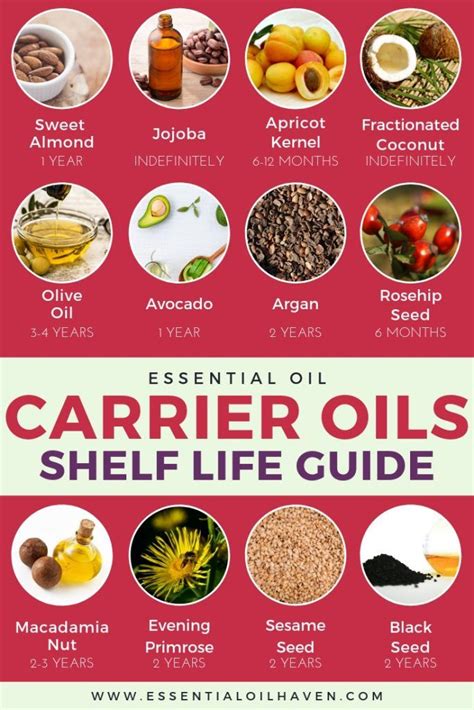Essential oils are highly concentrated plant extracts that offer a wide range of therapeutic benefits. However, these potent oils cannot be applied directly to the skin due to their high concentration. This is where carrier oils come into play. Carrier oils are vegetable-based oils that are used to dilute essential oils before applying them topically.

What is a Carrier Oil?
Carrier oils are typically plant-based oils that are derived from the seeds, nuts, or kernels of various plants. They are chosen for their mild aroma, low volatility, and ability to nourish the skin.
7 Benefits of Carrier Oils for Essential Oils
- Dilution: Carrier oils dilute essential oils, making them safe for topical application.
- Absorption: Carrier oils help essential oils penetrate the skin more effectively.
- Nourishment: Carrier oils provide essential fatty acids and vitamins that nourish the skin.
- Reduced Irritation: Carrier oils can help reduce skin irritation caused by some essential oils.
- Extended Shelf Life: Carrier oils can extend the shelf life of essential oils by preventing evaporation.
- Synergy with Essential Oils: Some carrier oils may enhance the therapeutic benefits of specific essential oils.
- Customized Blends: Carrier oils allow you to create custom essential oil blends that meet your individual needs.
Choosing the Right Carrier Oil
Selecting the right carrier oil is crucial for maximizing the benefits of essential oils. Here are some factors to consider:
- Skin Type: Different carrier oils are suitable for different skin types. For example, jojoba oil is ideal for oily skin, while sweet almond oil is better for dry skin.
- Essential Oil Compatibility: Some carrier oils may interact with certain essential oils. Refer to the essential oil’s safety guidelines before choosing a carrier.
- Aromatherapy Goals: Some carrier oils have their own therapeutic properties, so consider their aroma when selecting one.
- Personal Preference: Ultimately, the best carrier oil is the one that you enjoy using.
13 Popular Carrier Oils for Essential Oils
| Carrier Oil | Benefits | Suitable for |
|---|---|---|
| Jojoba Oil | Non-comedogenic, moisturizing | Oily, acne-prone skin |
| Sweet Almond Oil | Rich in vitamins A, E, and D | Dry, sensitive skin |
| Grapeseed Oil | Lightweight, absorbs quickly | Oily, acne-prone, and mature skin |
| Coconut Oil | Moisturizing, antibacterial | Dry, sensitive, and eczema-prone skin |
| Olive Oil | Antioxidant, anti-inflammatory | All skin types |
| Argan Oil | Rich in antioxidants and fatty acids | Dry, aging, and damaged skin |
| Rosehip Oil | Rich in vitamin C, promotes collagen production | Aging, damaged, and scarred skin |
| Avocado Oil | Nourishing, anti-inflammatory | Dry, mature, and sensitive skin |
| Evening Primrose Oil | Regulates hormones, reduces inflammation | Hormonal acne, eczema, and psoriasis |
| Sunflower Oil | Rich in vitamin E, non-comedogenic | All skin types, including oily and acne-prone |
| Hemp Seed Oil | Rich in omega-3 and omega-6 fatty acids | Dry, sensitive, and acne-prone skin |
| Sesame Oil | Anti-inflammatory, antioxidant | All skin types |
| Castor Oil | Anti-inflammatory, moisturizing | Dry, sensitive, and scalps |
DIY Essential Oil Blend Recipes with Carrier Oils
Relaxation Blend:
– 5 drops lavender essential oil
– 3 drops bergamot essential oil
– 2 drops chamomile essential oil
– 1 tablespoon coconut oil
Pain Relief Blend:
– 3 drops peppermint essential oil
– 2 drops eucalyptus essential oil
– 1 drop frankincense essential oil
– 1 tablespoon grapeseed oil
Cooling Blend for Sunburns:
– 5 drops peppermint essential oil
– 3 drops aloe vera essential oil
– 2 drops rosehip essential oil
– 1 tablespoon coconut oil or shea butter
Tips for Using Carrier Oils with Essential Oils
- Always do a patch test on a small area of skin before applying essential oils mixed with carrier oil.
- Start with a low concentration of essential oil and gradually increase it as needed.
- Store essential oil blends in a cool, dark place to extend their shelf life.
- Avoid using essential oils that are known to be irritating or toxic.
- Never ingest essential oils or carrier oils.
How to Use Carrier Oils with Essential Oils Step-by-Step
- Choose a carrier oil: Select a carrier oil based on your skin type and essential oil compatibility.
- Measure the essential oil: Add the desired amount of essential oil to the carrier oil.
- Mix thoroughly: Shake or stir the mixture until the essential oil is evenly distributed.
- Apply: Apply the essential oil blend to the desired areas of the skin.
- Massage: Use gentle circular motions to massage the blend into the skin.
New Applications for Essential Oil Blends with Carrier Oils
Beyond traditional topical applications, essential oil blends with carrier oils can be used in various unconventional ways:
Diffusion: Mix a few drops of essential oil blend with water in a reed diffuser or ultrasonic diffuser to release the aroma into the air.
Bath Bombs: Add a few drops of essential oil blend to Epsom salt and baking soda, then mold into shapes for a relaxing bath experience.
Candles: Create scented candles by mixing essential oil blends with melted wax.
Massage Bars: Combine essential oil blends with melted butters or waxes to create solid massage bars for muscle relaxation.
FAQs about Carrier Oils for Essential Oils
Q: Can I use any oil as a carrier oil?
A: No, only certain plant-based oils with mild aromas and low volatility are suitable as carrier oils for essential oils.
Q: How much essential oil should I add to a carrier oil?
A: The recommended dilution rate for essential oils in carrier oils typically ranges from 2% to 10%.
Q: Can I mix different carrier oils?
A: Yes, you can mix carrier oils to create custom blends that meet your needs. However, always test the mixture on a small area of skin before applying it to larger areas.
Q: What are the benefits of aromatherapy with essential oils and carrier oils?
A: Aromatherapy with essential oils and carrier oils can promote relaxation, reduce stress, improve mood, and alleviate physical discomfort.
Q: Where can I buy carrier oils for essential oils?
A: Carrier oils for essential oils can be purchased at health food stores, pharmacies, and online retailers.
Conclusion
Carrier oils are essential for safely and effectively using essential oils for topical applications. By understanding the benefits and properties of different carrier oils, you can create custom essential oil blends that meet your individual needs. Remember to always do a patch test and consult with a healthcare professional if you have any concerns.
